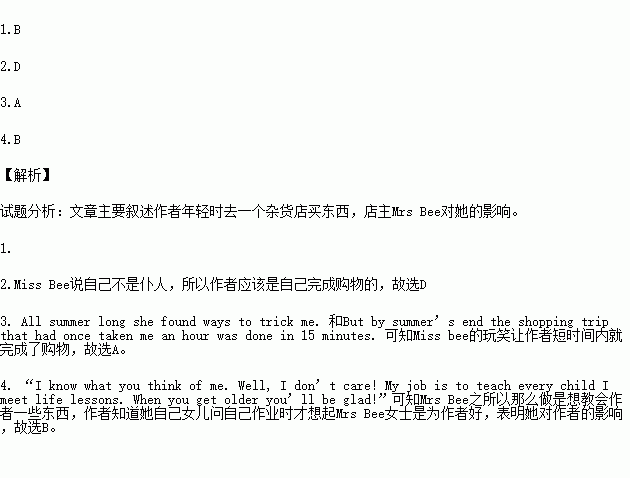题目内容
When I spent the summer with my grandmother, she always set me down to the general store with a list. Behind the counter was a lady like no one I’d ever seen.
“Excuse me,” I said. She looked up and said, “I’m Miss Bee.”
“I need to get these.” I said, holding up my list. “So? Go get them. ” Miss Bee pointed to a sign. “There’s no one here except you and me and I’m not your servant, so get yourself a basket from that pile.”
I visited Miss Bee twice a week that summer. Sometimes she shortchanged me. Other times she overcharged. Going to the store was like going into battle. All summer long she found ways to trick me. No sooner had I learned how to pronounce “bicarbonate of soda” and memorized its location on the shelves than she made me hunt for it all over again. But by summer’s end the shopping trip that had once taken me an hour was done in 15 minutes. The morning I was to return home, I stopped in to get some run.
“All right, little girl,” she said. “What did you learn this summer?” “That you’re a meanie!” I replied. Miss Bee just laughed and said, “I know what you think of me. Well, I don’t care! My job is to teach every child I meet life lessons. When you get older you’ll be glad!” Glad I met Miss Bee? Ha! The idea was absurd…
Until one day my daughter came to me with homework troubles. “It’s too hard,” she said. “Could you finish my math problems for me?”
“If I do it for you, how will you ever learn to do it yourself?” I said. Suddenly, I was back at that general store where I had learned the hard way to add up my bill by myself. Had I ever been overcharged since?
1. What did the author’s grandmother always ask her to do during her summer vacation?
A. Make lists for her shopping.
B. Buy something in the general store.
C. Send lists to the lady in the general store.
D. Go to see the lady in a store.
2.How did the author first shop in the store?
A. She shopped with her grandmother together.
B. Miss Bee gave her a hand.
C. She asked a servant to help her.
D. She served herself.
3.What can we infer about Miss Bee?
A. Her tricks made the author finish shopping in a shorter time.
B. She neither shortchanged the author nor overcharged her.
C. Teaching kids lessons was Miss Bee’s job at that time.
D. Miss Bee used to learn to pronounce the names of some goods in the store.
4.The author mentioned her daughter to __________.
A. show her satisfaction with her kid’s homework.
B. tell readers Miss Bee’s influence on her.
C. inform readers of her irresponsibility for her kid.
D. express her opposition to Miss Bee.



 ined word “grudge” in the first paragraph most probably means _________.
ined word “grudge” in the first paragraph most probably means _________. ter, what is the right way to calm down after being hurt?
ter, what is the right way to calm down after being hurt? erson who hurt you.
erson who hurt you.